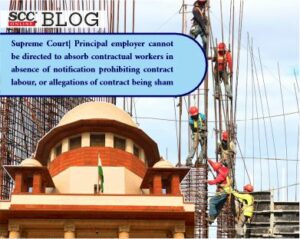Supreme Court: In an appeal filed against the judgment of Madhya Pradesh High Court, wherein the High Court has confirmed the judgment passed by the Industrial Tribunal ordering reinstatement of the respondents, the division bench of M.R Shah* and Hima Kohli said that in the absence of any notification under Section 10 of the Contract Labour (Regulation and Abolition) Act, 1970 (‘CLRA Act’) and in the absence of any allegations and/or findings that the contract was sham and camouflage, both the Industrial Tribunal as well as the High Court have committed a serious error in reinstating the respondents and directing the appellant to absorb them as their employees.
Further, the parties shall be governed by the CLRA Act and relief, if any, could have been granted under the provisions of the CLRA Act and not under the Madhya Pradesh Industrial Relations Act, 1960 (‘MPIR Act’). Thus, the Court set aside the impugned judgment of the High Court and the Tribunal and restored the Labour Court’s judgment.
In the case at hand, the respondents were contractual labourers of a contractor who was engaged by the appellant in terms of contract. Upon entering the contract, necessary compliances under CLRA Act was completed by the appellant and the contractor. Therefore, the services of the respondents were dispensed with by the contractor. Accordingly, the appellant filed a return under CLRA Act, which shows that the contract had come to an end.
According to the appellant, all statutory payouts, including the salary of the workmen were paid by the contractor, since under the CLRA Act, the ultimate responsibility would be upon the appellant if these were not paid by the contractor. Thereafter, the respondents approached the Labour Court praying inter alia that they were employees of the appellant, who had been orally terminated by the contractor and sought to be reinstated in service. The Labour Court held that the contractor had obtained license under the CLRA Act and that the contesting respondents were the employees of the contractor and not of the appellant. Upon appeal, the Industrial Tribunal passed an order of reinstatement and held that a contract labourer automatically becomes an employee of the principal employer.
The Court said that on going through the entire material on record, no documentary evidence was produced, by which it can be said that the respondents were the employees of the appellant. Further, there is no provision under Section 10 of the CLRA Act that the workers employed by the contractor automatically become the employees of the appellant and/or the employees of the contractor shall be entitled for automatic absorption and/or they become the employees of the principal employer.
The Court also noted that the direct control and supervision of the respondents was always with the contractor and there is no evidence on record that any of the respondents were given any benefits, uniform or punching cards by the appellant.
The Court said that merely because sometimes the payment of salary was made and/or provident fund contribution was paid by the appellant, which was due to non-payment of the same by the contractor, the respondents shall not automatically become the employees of the principal employer.
The Court referred to SAIL v. National Union Waterfront Workers, (2001) 7 SCC 1 and observed that in the absence of a notification under Section 10 of the CLRA Act, unless there are allegations or findings regarding a contract being sham, the workmen of the contractor, cannot be held to be employees of the appellant and not of the contractor. Thus, in the present case neither any notification under Section 10(1) of the CLRA Act has been issued prohibiting contract labour, nor are there allegations and/or even findings that the contract is sham and bogus.
Applying the law laid down in International Airport Authority of India v. International Air Cargo Workers’ Union, (2009) 13 SCC 374 and Steel Authority of India Ltd. (supra) to the facts of the case on hand, said that in the absence of any notification under Section 10 of the CLRA Act and in the absence of any allegations and/or findings that the contract was sham and camouflage, both the Industrial Tribunal as well as the High Court have committed a serious error in reinstating the contesting respondents and directing the appellant to absorb them as their employees.
[Kirloskar Brothers Ltd. v. Ramcharan, 2022 SCC OnLine SC 1676, decided on 5-12-2022]
*Judgment by: Justice M.R Shah
*Apoorva Goel, Editorial Assistant has reported this brief.

